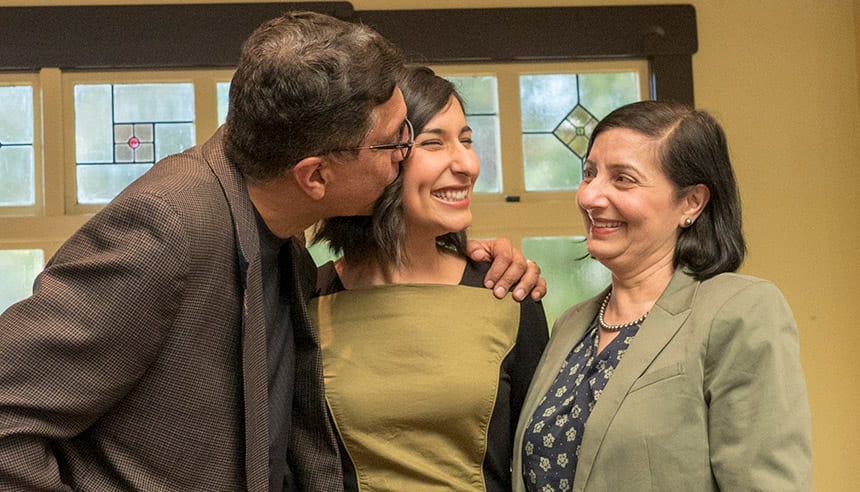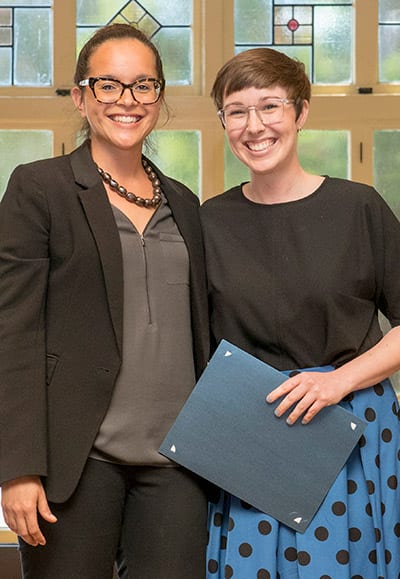
By Andrew Cohen
For Nirali Beri ’19, whose parents emigrated from India, “witnessing their struggle to make the United States home in the face of cultural barriers and discrimination pushed me to learn more about systems of inequality. Their perseverance inspires me and their support is … why I’m able to do work that I care about.”
Her parents were in attendance April 22 at the Bancroft Hotel, where Beri received Berkeley Law’s annual Sax Prize for Clinical Advocacy. She was honored for her exceptional efforts at the school’s East Bay Community Law Center and Death Penalty Clinic.
Named for the late Brian Sax ’69, a respected San Francisco litigator and Berkeley Law lecturer, the prize honors a graduating legal clinic student who displays excellence in advocacy and professional judgment. Beri was chosen from a group of nominated students from the school’s various clinics.
As a 1L, she joined EBCLC’s Tenants’ Rights Workshop, which helps low-income tenants facing landlord harassment, illegal rent increases, and inhabitable living conditions. She co-directed the group the following year and also joined EBCLC’s Housing Practice, where she negotiated settlements that kept evictions off clients’ records and allowed them to remain in rent-controlled units and subsidized housing programs.
Housing Practice Director Meghan Gordon ’11 hailed Beri’s “mixture of brilliance, humility, kindness, compassion, and tenacity.” Gordon described her work on behalf of a single parent living in subsidized housing, who had come to EBCLC behind in rent after her ex-husband repeatedly assaulted her and took the rent money she had saved.
“Nirali approached this case with the perfect balance of compassion and zeal,” Gordon said. “Many law students take a myopic view of eviction cases, focusing exclusively on the legal issues. Nirali, however, listened to the client’s goals and crafted a case strategy that addressed all of her needs.”
Beri secured a safety transfer, allowing the client to move to a new apartment away from her abuser, while ensuring that her children did not have to change schools. She also secured financial assistance to help the client pay the back rent owed, and connected her with EBCLC’s Health and Welfare Practice to apply for public benefits and further stabilize her family’s income.
Helping on death row
At the Death Penalty Clinic this year, Beri helped write a social history for a client’s state habeas petition to assert why he does not deserve a death sentence. Visiting the client on Texas’ death row three times, she was “struck by the ways the system intentionally seeks to break our client’s spirit and discount his humanity.”
Beri said prison guards led packs of hunting dogs around the prison to intimidate those incarcerated. Her client spent 23 hours a day in solitary confinement, could only speak to her only through a glass partition using a subpar phone, and was barred from using the bathroom during their visits.
“I’ve never seen a student dive into the complicated world of capital defense with so much interest and enthusiasm,” said Death Penalty Clinic supervising attorney Kathryn Miller ’07. “She gave up weekends, her winter break, her spring break, and even part of this (final exam) reading period, often working 16-hour days without a single complaint.”
Beri’s said clinical work solidified her understanding that commitment to social justice “requires us to go beyond responding to the most obvious instances of injustice, and taking collective responsibility for the harm that our actions, or inaction, inflicts on others.”
Clinic recap & Honorable Mention Award
Earlier in the ceremony, Elisabeth Semel (Death Penalty Clinic), Claudia Polsky ’96 (Environmental Law Clinic), Roxanna Altholz ’99 (International Human Rights Law Clinic), Stephanie Campos-Bui ’14 (Policy Advocacy Clinic), Robert Walker (Samuelson Law, Technology & Public Policy Clinic), and Seema Patel ’06 (EBCLC) recapped their students’ accomplishments over the past year.

Dean Erwin Chemerinsky noted the impact clinic students are making in marginalized communities. Berkeley Law’s clinical program is ranked No. 7 by U.S. News & World Report—its highest rating ever.
Hannah Flanery ’19, another extraordinary housing rights advocate, received the Sax Prize Honorable Mention Award.
Gordon relayed how during Flanery’s first semester at EBCLC, she volunteered to be first chair of a court trial—on one day’s notice—for a tenant she had just met. “Hannah fought hard in the trial and beat a landlord who was represented by an attorney,” Gordon said. “This is something that has never happened in the history of the housing unit, and Hannah did it as a 2L.”
During her second semester, Flanery prodded Gordon to represent a family that had lost its eviction case. The family had lived in the same home for 15 years, losing the case on a technicality.
After exhaustive research, Flanery developed a novel legal argument to overturn the prior decision. She drafted several complex motions, and argued in court for a full hour against an opposing attorney with 30 years of experience.
“Hannah has saved tenancies and lives of people that many others would have given up on,” Gordon said. “I feel lucky to call myself her supervisor, and I’ve learned so much from watching her in action.”
Flanery shared her appreciation for “the incredible work that the housing team does. They’re a team of fighters who are constantly prepared to go to battle on behalf of low-income tenants in Alameda County. As we all know, they’re fighting a very difficult fight. But lucky for us, they show no signs of giving up anytime soon.”
Both Sax Prize honorees will continue advocating for housing rights after graduation, Beri at Centro Legal de la Raza in Oakland and Flanery at Legal Assistance to the Elderly in San Francisco.